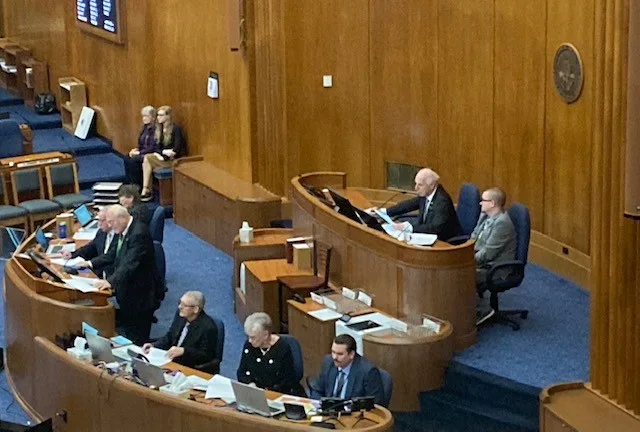

BISMARCK – The North Dakota State House has passed a resolution proposing changes to current term limits in the constitution that had been passed by voters in November.
Current term limits in Article XV of the constitution, passed by more than 63% of voters in November 2022, prohibit a person from serving more than a total of eight years in the House, Senate, and governor’s office, separately. The years for those term limits began after the measure took effect in January. Also in Article XV is a provision that prohibits the legislative assembly from proposing amendments to term limits.
House Concurrent Resolution 3019 would place on the June 2024 ballot a proposed change to the current term limits from eight total years to 12 consecutive years. The resolution would also add 12-consecutive-year term limits to other executive positions. After a person has taken a four-year break from each office, he or she would be allowed no greater than 12 more consecutive years for that office. The resolution also removes the provision that prohibits the legislative assembly from changing term limits.
“There’s a major potential constitutional flaw in Article 15,” said the sponsor of the bill, Rep. Jim Kasper, R-Dis. 46, Fargo. “Those who currently serve in an even numbered district will be able to serve an additional six years, while those serving in an odd numbered district will be able to serve eight additional years. This flaw in article 15, according to a number of constitutional attorneys, could be unconstitutional due to the unequal treatment of legislators.”
Kasper states Article I, section 21 as a source. He added he believes there could be a constitutional question due to the provision that prohibits the legislative assembly from proposing changes to term limits, reading from Article IV, section 16.
“Let’s assume that every eight years you must fire one hundred percent of your employees and replace them with all new employees and you can never ever rehire those first employees again,” said Kasper. “This is exactly what the current term limits measure requires, and that’s what HCR3019 will replace and remedy.”
Jared Hendrix of Fargo, former chairman of the sponsoring committee for term limits, said at the HCR3019’s committee hearing, in responding to Kasper, that it is common throughout the constitution for exceptions to be created.
“You have the general authority to enact laws, but there’s many parts of the constitution that say specific things that you can’t do,” said Hendrix. “That is not unprecedented. I did mention in my testimony several sections where that is the case.”
Hendrix also states in his testimony “While Article IV, Section 16 grants the legislature the authority to propose amendments, Article XV establishes an exception. The legislature is restricted from the act of proposal itself, regardless of the two thirds threshold it may achieve in a legislative chamber.”
Rep. Brandy Pyle, R-Dis. 22, Casselton, raised concern on the House floor that some who signed the term limits petition may have been told they were signing term limits for U.S. Congress.
“I was approached at the parking lot at the Fargo DMV to sign one of these petitions and they thought it was for the people that serve in D.C. and it was not for us, and that’s what I was told,” said Pyle. “Now I know better, and I told the guy what it was actually for and he ran back to the car.”
“I believe the people knew what they were voting for,” said Rep. Donna Henderson, R-Dis. 9B, Calvin. “I believe this resolution does go against the will of the people.”
Hendrix responded to these concerns at the committee hearing, saying, “The burden of the campaign is to get the message out. I can tell you on our campaign, every person that I talked to, and I talked to literally hundreds and hundreds of voters, every single person I told them exactly what the measure was about. It’s anecdotal, whether you could say one or two or five percent of the voters had a misunderstanding, are we going to apply that standard to every other law or measure that was passed?”
Hendrix added that the language on the ballot mentioned nothing about congress.
HCR3019 passed by a vote of 63 to 29 and has been sent to the Senate for consideration.